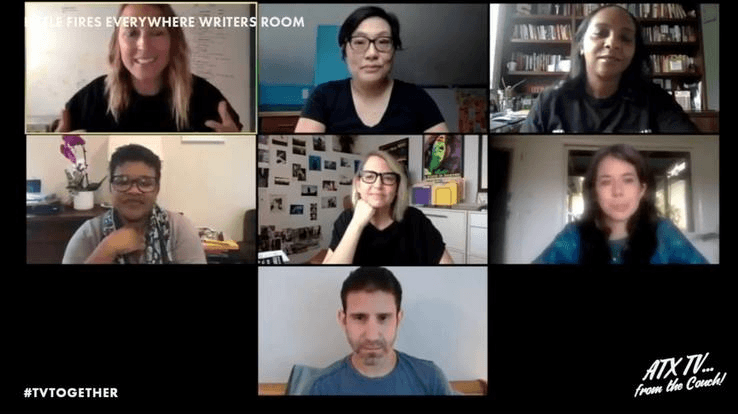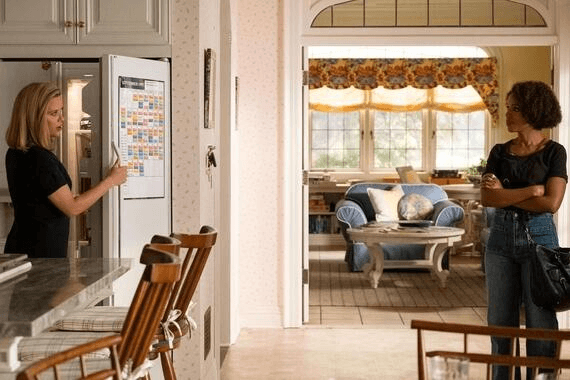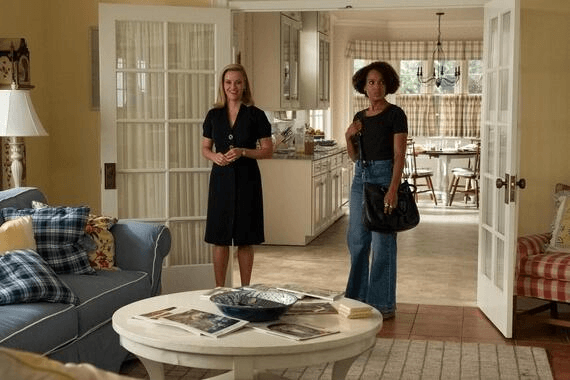Challenging Your World View: The Writers of Hulu’s “Little Fires Everywhere” Talk About The Show’s Important Themes
The ATX Television Festival went virtual this year, giving the writing team behind Hulu’s Little Fires Everywhere the opportunity to have a public discussion about how the show’s themes relate to the protests and gained traction of the Black Lives Matter movement following the murder of George Floyd. Series creator Liz Tigelaar joined seven of the show’s eight writers for a virtual conversation about their experiences on this show and beyond.
“Obviously we’re a show that’s grieving right now,” Liz Tigelaar opened the panel by first talking about the recent death of Lynn Shelton, who directed four episodes and passed away in May. “We’re also grieving with the country for the life of George Floyd, all the Black men and women who’ve been murdered simply for being Black. And today, we really just wanted to have a conversation. I think now more than ever, who’s telling these stories and whose stories we tell, it matters more than ever. And so to talk about these stories in Little Fires and these characters, whether its a white liberal woman who doesn’t see herself as racist at all, or a queer Black single mom whose art is her passion and her voice, or a Chinese illegal immigrant who’s having to fight for custody in a country she wasn’t born into just to have her own daughter with her. These are all characters that get to be the jumping off point for conversation. It starts a dialogue that really helps us examine our own blindspots and our own biases and our own shortcomings and hopefully expands and broadens our world view.”
As the head of the series, Liz Tigelaar was careful in selecting a diverse group of writers who could each bring their own experience to the table and add nuanced layers to the series’ core themes. Of the eight writers, seven were women and four were persons of color. In a series where a white woman’s (Elena Richardson, played by Reese Witherspoon) worldview is confronted by a Black woman (Mia Warren, played by Kerry Washington), this was crucial to doing justice to the sensitive topic.
“I knew it was going to be just eight writers and I knew that, especially being an upper level writer, I basically assumed that I would be the only black writer,” Raamla Mohamed shared about her typical experience writing on a television series. She had previously worked with Kerry Washington as a writer on all seven seasons of ABC’s Scandal. “So to walk into the room and see Shannon [Houston] and Attica [Locke] was like, even just thinking about it, I get emotional. Because I just realized I’m not going to have to spend seventy-five percent of my time just trying to be the Black voice… And it was great because Shannon, Attica, we’re all similar but we’re also very different and we have different experiences and I felt like Attica can have sympathy for Elena without feeling obligated to also have empathy for Mia and Brian and all that. So for me, it was very freeing to not only talk about edges, and that’s important, but I also can talk about Bebe and Linda and other characters and be free of that burden of race.”
“I feel like the room was very safe and I think that came from the top,” Attica Locke shared, whose other credits include When They See Us and is the author of five books herself, making this project all the more exciting as she was adapting another author’s work for the screen. “There’s no punitive energy going around and I think you also hire people who are respectful of other people,” she added, speaking to Liz. “I always felt safe and I always had a world view of room first, Attica second. The room has to function first.”
Nancy Won felt the same way, having previously worked with Liz Tigelaar on dramas like American Dreams, Brothers and Sisters, and Everwood. “Not having to manage my room persona as much as a woman and as a person of color just gave me so much more energy to be creative and to talk and to just feel more relaxed. Because I think that is a big part of trying to be a creative person, but it’s this completely political atmosphere that as a person of color and as a woman, you’re constantly taking the temperature and who am I [upsetting] and who am I losing and all that managing of yourself is just exhausting.”
As the lone white male in the writer’s room, Harris Danow appreciated the rest of the team’s faith in him. “Everyone looked at me with just an extraordinary amount of good faith that even if I said something that someone perceived as problematic, it wasn’t coming from a hostile place,” the former lawyer turned writer shared. “And I think that is very freeing and not just about complex political issues, but when you’re talking about your own experience and just that’s where all the best stories come from, people have to feel comfortable enough to share anything and this room had that in abundance.”
Amy Talkington, whose remake of the 1980’s cult classic Valley Girl recently premiered, was another white voice in the writer’s room. “It also felt like it wasn’t just about talking and getting your point out, but it was also about listening. There was so much listening that made our room successful.” Each of the writer’s also shared a little bit of background about themselves and what they brought to the characters. Amy grew up in a town similar to Shaker Heights and had a family dynamic similar to the Richardson’s, but also moved to New York to study art which gave her a strong connection to Mia. Nancy Won immigrated to the United States as a child and felt a deep connection to Bebe, but also lived in a small apartment in a great school district where her upbringing was impacted by wealth disparity, making it easy for her to write scenes for Mia’s daughter Pearl. Raamla Mohamed went to high school in the 1990’s and as a Black teenager, was able to articulate the microaggressions that are brought into the light throughout the series. As a mother, Attica Locke was attracted to exploring the themes of envy that Elena and Mia feel towards each other’s relationships with each other’s children. And Rosa Handelman grew up near Shaker Heights, Ohio, and was able to add details about the white upper class environment that nobody else would be able to.
“Yes, you are the product of your environment, but it doesn’t mean that you’re trapped in it,” Attica Locke explained about a big message viewers can take away from Little Fires Everywhere and the Black Lives Matter movement. “I’m married to a white guy who’s from a small town in Missouri. They was having confederate parades when he was a kid, you’ve got a brother over here who’s a Trump supporter, it’s crazy. But my husband’s life has been lived in such a way that he is a thinking person, he is a curious person, and he investigated the [stuff] that he was raised with. And so I think Elena, looking at that final piece, there’s a way in which you can have compassion for. ‘I didn’t see some stuff because I was made of this flowered, white, watered down place and so I didn’t see stuff.’ For a moment, you can give Elena that compassion, but what do you do now with that? You can’t just rest on the fact that, well, I can’t help that I was born with money, I can’t help that I was born white, I can’t help that I was born Black but with other resources that other black people don’t have. We all have a responsibility and I think that’s that final art piece to me. That you are of this, but you can break out of it.”
“I think that becoming a better person, becoming a more thoughtful person, becoming a more empathetic person takes work,” Harris Danow explained about the challenge ahead of many to move forward from this moment of time as a better people than we were before. “And I understand and it’s something that I’m continually trying to do. But I think what Attica’s talking about with Elena, it’s like, to a certain extent, she comes by her worldview honestly. She was born into it. But when she’s confronted with it, she is overly defensive and doesn’t for a second take the moment to reflect on it. And that’s sort of natural when people are attacked and called names. Their first reaction is to be defensive, no matter what the subject is. But I think you can contrast that with Izzy in that scene with Mia when Mia calls her out. ‘You’re not the exception just because you think you are.’ Her first reaction is to pout, but then as Mia sort of continues to talk… I think she understands to stop and listen and reflect. You know, there’s white people like Elena and then there’s white people like Izzy in the sense that they feel very self righteous about things, like I’m not one of them, when in fact we all have assumptions about a lot of things. What I hope is that people watching this show are more willing to not have a knee flex defensive reaction, but to really think and interrogate.”
Little Fires Everywhere seems to have come at a time when America needs it the most. All eight episodes are now streaming exclusively on Hulu where viewers can take this important journey with the Richardson’s and the Warren’s. It’s a story about challenging your world views to make the world a better place, whether it’s Shaker Heights, OH, or your own neighborhood.





